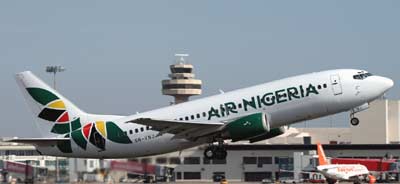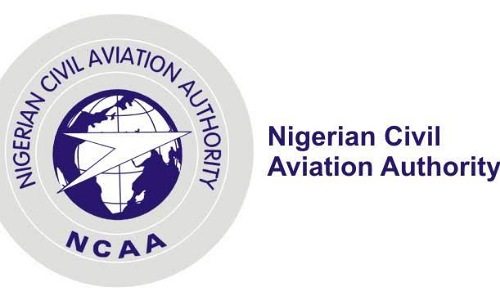Aviation
Experts raise alarm over death of domestic airlines in Nigeria
Aviation experts yesterday raised an alarm on the possible death of all domestic airlines operating in the country in the next five years if adequate measure was not put in place by the Federal Government to salvage the situation.

By Oyise Oghene
Aviation experts Sunday raised an alarm on the possible death of all domestic airlines operating in the country in the next five years if adequate measure was not put in place by the Federal Government to salvage the situation.
This warning is coming barely when two vibrant domestic airlines have gone into oblivion, the suspension of Dana airline due to the ill-fated plane crash that Killed all 153 passengers onboard its aircraft, the McDonnell Douglas 83, MD 83 that crashed at the Iju-Shaga area of Lagos and Air Nigeria which is currently grounded by the Nigerian Civil Aviation Authority (NCAA) due to financial distress of the airline.
 Other airlines like Chanchangi airline and FirstNation airline have all suspended their operations as their aircraft had been taken for maintenance abroad.
Other airlines like Chanchangi airline and FirstNation airline have all suspended their operations as their aircraft had been taken for maintenance abroad.
At the moment there are only three schedule commercial airlines operating in the country, IRS airline, Arik airline and Aero Contractors airline whose capacity put together have not been be able to adequately provide sufficient air transportation to the Nigerian travelling public.
Contrary to the fact that there are about 19 to 22 airlines operating in the country according to the records of the Nigerian Civil Aviation Authority (NCAA), investigation conducted by Biztellers reveals that almost all the airlines have gone into extinction leaving only three schedule commercial airline operators which are IRS airline, Aero Contractors and Arik Air while others include Overland Airways, Associated airlines, Bristow Helicopters, OAS, Caverton amongst a few other thus making it inadequate to meet up with the growing demand of air travel in the country.
Speaking on the possibility of the Nigerian aviation industry loosing all its airline if the Federal Government fails to save the situation, President of Nigerian Aviation Safety Initiative (NASI), Captain Dung Pam have said that if care was not taken that Nigeria would not have any indigenous airline whether a regional or domestic carrier flying in the country’s airspace in the next five years.
Disclosing this development to newsmen during an interactive session in his office in Lagos, Captain Pam said”I guarantee you that we will not have any airlines in the next five years”
“All the ones that we have now will go but you know what, they will be replaced and the replacement may not even be an African carrier, I don’t know how many of you is following what is happening now, as you know Telus, the former Chairman of Easy Jet and Robica group are planning to invest about US$500million to start up a low cost carrier based in Accra, Ghana” he said.
Captain Pam further stressed that when this happens all the traffic emanating from the Nigerian aviation industry would be shifted to Ghana thus leaving Nigeria at the receiving end.
He said”As you know Nigeria is at the moment 18 percent of the population of the whole of Africa, we are 47 percent of the population of the whole of West Africa, we provide 65 percent of all the traffic in West Africa now non of our airlines are proven that they are making profit, non not one and that is why I said four days ago and I said final advice to the aviation industry in Nigeria, to the operators consolidate the airlines or die and to the government support, structure or loose strategic control of the industry and that is happening gradually one after the other”
He further pointed out that the only solution for the survival of Nigerian airlines was for them to merge together to become a formidable airline that can compete favourably with other airlines in the world while the government should support the airlines to survive.
Corroborating Captain Dung Pam, The President, Sabre Networks and Former Executive Director, Belleview Airlines, Mr. Gbenga Olowo stressed that the government should be asking the question why are all our airlines dying adding that there could be political under tone to why all these airlines have gone into oblivion.
“If Okada airline will die, if Kabo will die and EAS died, if Bellview of so many years will died and so on, what is Nigeria and its government doing, Is it that all the investors are crazy people, Is it because they are Nigerian, we should be asking the question as a mother why are my children dying. Then we used to hear that there was no political will and you can burn all your money and Okada airlines and others failed with its Boeing 747 that was rousing away at the tarmac because there was no political will. I think we should really ask the government why are our domestic airline dying” he asked.
Mr. Olowo however noted that for sanity to prevail in the aviation industry, the Federal Government must be ready to force all local airlines operating in the country to consolidate into four formidable airlines that can favourably compete with other airlines in the world.
He said”I want to see a Nigeria with four private airlines, very strong ones, for example if you add up all the 22 aircraft in NCAA’s record in the country now, it is less than the fleet of EasyJet or JetUs, these are small airlines operators in Europe and in the USA, some of them have 100 pieces of aeroplanes which ranges 100million dollars”
Aviation
JUST IN: Emirates Airlines Set To Restore Flights To Nigeria
Emirates Airlines has announced plan to resume flight operations to Nigerian airports on October 1, 2024, after a two-year hiatus.
The news was shared by the airline on its verified X handle on Thursday.
It stated, “We’re back Nigeria! We’ll be resuming services to Lagos from 1 October 2024, and we can’t wait to offer unrivalled connectivity to Dubai and beyond to over 140 cities.”
The development was hinted at earlier by Nigeria’s Minister of Aviation and Aerospace Development, Festus Keyamo, SAN.
In a post on X on Wednesday, Keyamo disclosed that he met with the Ambassador of the United Arab Emirates (UAE) to Nigeria, Salem Saeed Al-Shamsi, in Abuja on Tuesday.
He stated that during the meeting, Al-Shamsi handed him a correspondence from Emirates Airlines confirming the flight resumption date.
The Minister wrote “Yesterday (On Tuesday), I paid a working visit to the Ambassador of the UAE to Nigeria, His Excellency, Salem Saeed Al-Shamsi at the UAE Embassy in Abuja.
“He handed me a correspondence from the Emirates Airline indicating a definite date of their resumption of flights to Nigeria. That date will be formally announced by Emirates Airlines in a matter of days.”
The announcement signifies another step taken by the Nigerian government to reinstate flight operations between Nigeria and the UAE.
In November 2023, Minister Keyamo had announced that Emirates Airlines would soon disclose the exact date of their return to Nigerian skies.
The flight suspension between the two nations had been amidst a broader diplomatic dispute, primarily concerning the Bilateral Air Services Agreement (BASA).
Visa restrictions further exacerbated the situation, impacting numerous Nigerian migrants and tourists, given the UAE’s popularity as a destination.
Recall that Emirates Airlines suspended its flights to Nigeria in 2022 due to challenges in repatriating funds trapped in the country.
Despite a meeting in September 2023 between Nigeria’s President Bola Tinubu and UAE President Mohamed bin Zayed Al Nahyan in Abu Dhabi, where there were rumors that the UAE had lifted its visa ban on Nigerian travelers, the ban still stands.
Presidential spokesman Bayo Onanuga later clarified that the UAE had not lifted the visa restrictions on Nigerians.
Aviation
JUST IN: NCAA Suspends 3 Jet Operators

The Nigerian Civil Aviation Authority (NCAA) has taken action by suspending the permits of three private jet operators due to their involvement in commercial flights.
Chris Najomo, the Acting Director General of the NCAA, issued this suspension during a briefing to all airlines on Tuesday.
Additionally, Najomo ordered a re-evaluation of all PNCF permits within a 72-hour timeframe.
The head of the NCAA stated that Festus Keyamo, the Minister of Aviation and Aerospace Development, had instructed the discontinuation of private jets’ commercial use in 2023.
Despite this directive, the operators persisted in their commercial activities.
Najomo said “Subsequently, in March 2024, the NCAA had issued a stern warning to holders of the permit for non commercial flights, PNCF, against engaging in the carriage of passenger cargo or mail for hire and reward.
“The Authority had also deployed its officials to monitor activities of private jets at terminals across the airports in Nigeria.
“As a consequence of this heightened surveillance, no fewer than three private operators have been found to be involved in violation of the annexure provision of their PNCF and Part 9114 of the Nigeria Civil Aviation Regulations 2023.
“In line with our zero tolerance for violation of regulations, the Authority has suspended the PNCF of these operators.”
Aviation
Keyamo Charges NCAT To Produce 4,203 Controllers By 2037

Minister Festus Keyamo has urged the Nigerian College of Aviation Technology in Zaria, Kaduna State, to create new solutions that can speed up the training of skilled air traffic controllers.
This call comes as Africa anticipates a need for 4,203 new air traffic controllers by the year 2037.
The minister made this statement on Wednesday during the 34th IFATAC Africa and Middle East Regional meeting in Abuja.
Addressing the gathering, the minister noted that the goal of training 4,203 new air traffic controllers aligns with the projection from the International Civil Aviation Organization (ICAO).
He further affirmed the ministry’s commitment to offering full support to NCAT, ensuring it not only meets but surpasses its mandated duties and roles.
He said “ICAO projects that by the year 2037, Africa will require 4,203 new air traffic controllers. The onus rests on the Aviation College of Aviation Technology (NCAT) to develop innovative ideas solutions to accelerate the training of new and proficient air traffic controllers.
The minister, represented by acting director Michael Chiko from Air Safety and Administration, highlighted the rapid evolution of the air traffic control profession.
He stated “The profession of air traffic control has evolved rapidly, transitioning from simple flag signalling to sophisticated technologies. This evolution facilitates management of the surging number of aircraft traversing our
skies daily.
“As a vital, indispensable component of air safety, air traffic controllers are responsible for the safe, orderly and expeditious flow of air traffic. Therefore, I am not unaware of the critical role you play and invariably, the heavy burden you bear.
“This burden is compounded by increased air traffic, workforce shortages, technological shifts; necessitating rigorous training regimes.
“More so, with the emergence of unmanned aerial vehicles, reshaping dynamics and challenging the norm, it is thus paramount to prepare for the future and indeed Nigeria like other countries must prepare for the future.” he added
During the event, Mr. Lawrence Pwajok, representing Engr. Mohammed Odunowo, the managing director of the Nigerian Airspace Management Agency (NAMA), emphasized the relevance of the 34th IFATCA Africa and Middle East Regional meeting’s theme, titled ‘Shaping the Future: Trends and Insights On ATC Training for Tomorrow’.
Pwajok highlighted the significance of this theme, especially as air traffic control commemorates 100 years since its inception.
He suggested examining the historical perspective of air traffic control, tracing its origins from Croydon airport a century ago to its present form in modern airports like Dubai, Istanbul, JFK, Charles De Gaulle, among others.
This historical comparison aims to provide insights into the potential trajectory of the future air traffic control system over the next century.
He added “It is obvious that the future air traffic management system will be characterised by extensive application of automation, digitization and artificial intelligence.”










